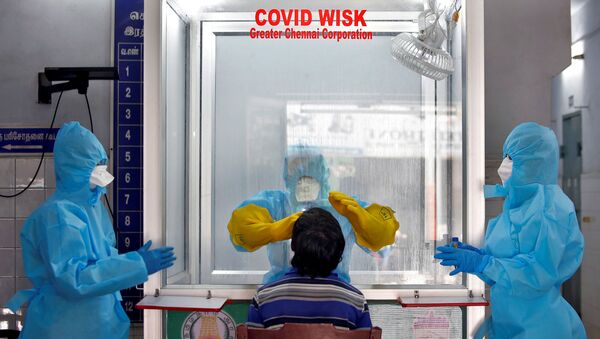Healthcare professionals, assigned with the responsibility of testing samples for coronavirus, have urged people to follow the advised precautionary measures like social distancing and self-isolation – which may not just save them but could also be of immense help to front line heath care workers.
It's the passion of healthcare workers who are constantly and tirelessly tackling the crisis, take all advised precautions and do not panic, researchers tell @SputnikInt pic.twitter.com/tOnL5eKmC8
— Radhika Parashar (@_RadhikaReports) April 27, 2020
Requesting cooperation from citizens, a number of researchers say they are doing their, but they also say that it is affecting their mental state. The emotions, they say, are unnerving.
Dr. Bernalee Biswas, a member of the Indian Council of Medical Research (ICMR) in Mumbai specialises in pathogenic microorganisms. He tells Sputnik: “Researchers are spending long durations inside the labs, testing samples. There is always a fear of getting exposed to the virus and also spreading it to others and your family members.”
“As microbiologists, we are used to handling pathogens in a laboratory setting with proper bio safety measures. But this pandemic situation has extended the mental stress from our labs to our homes now,” Dr. Biswas adds.
Recently, a 26-year-old doctor Vani Dutta from Mumbai spoke of the level of stress hospital staffers have been battling everyday since the coronavirus was declared a pandemic by the World Health Organisation in March. In an Instagram post, Dutta noted how doctors “pray that patients who come by do not have the virus”.
“My first time in the screening room was the scariest. You can only pray that every patient who comes by doesn’t have the virus or is wearing a mask. My scariest moment was when this young man came in and explained his symptoms. He had all the symptoms and he told me that he may have been in contact with someone who tested positive. At that point, I was sure he had it. And just then, he coughed. All I could do was tell myself– ‘I’m protected, I won’t get it’. For a month, I’ve been in contact with several COVID-19 positive patients. Yesterday was my birthday, and I woke up with a fever. It made my stomach drop and I panicked. Luckily, the fever went down in a few hours, and I was back to my routine,” Dutta’s post read.
Dutta has also noted the job is “tough, stressful and depressing” which also leads to anxiety among doctors.
Under these critical circumstances, work ethic, responsibility and patriotism have been the primary driving forces that have been helping medical professionals in India cope with the stress and mental pressure.
“It’s our job. This is the time to work. It is true that the hours are longer but then the reason why we are doing this is bigger than an individual. We are driven and focused on our work to save our country and humanity from this pandemic,” Saurabh Gupta, a member of MyLabs Pune which created India’s first indigenous home test kits for COVID-19, tells Sputnik.
Some recent COVID-19 positive cases in India have shown that a massive number of infected people in the country are asymptomatic, which the researchers have described as a prime concern.
“The standard testing method for detecting COVID-19 is the real-time RT-PCR method, which has high accuracy. However, the lack of symptoms makes identifying the actual number of virus-infected persons difficult. But the obvious asymptomatic patients to test are people with high risk of Coronavirus infection, such as those who have come in direct contact of an infected person,” said Dr. Biswas.
Speculation as to whether the virus is man-made or natural have also surfaced on social media, with the WHO stressing that there's no evidence that the virus was developed in a lab.
Researchers in India are also inclined towards believing that COVID-19 is natural, and not man-made.
“COVID-19 is earth's immune response for its own safety. Within just 30 days of lockdown we have observed that earth can recover with a faster rate if given time. Nature always finds its way. As the theory goes – ‘survival of the fittest’ -- Covid 19 is fatal to people who have underlying serious diseases,” said bio-tech researcher Chirag Parmar.
While the cure for this virus is still under the microscope, allowing healthcare experts to receive all the essential personal protection equipment (PPE) has emerged as a very important goal.
Several media reports from around the world have marked instances when doctors, nurses and hospital staff contracted the virus while treating the patients. To prevent this, healthcare professionals have time and again demanded better equipment supplies.
“The actual reason for this has not been assessed in India yet but is generally thought to be due to lack of adequate PPE and continuous exposure to infected patients. Proper use and disposal of PPE might help in reducing the chances of getting infected. Also, reducing the work burden on the medical staff would help minimise any human error during handling and treatment of COVID-19 patients,” Dr. Biswas added.
India has been taking active measures to meet the demands of PPE. Several entrepreneurs and volunteers are contributing in manufacturing and supplying PPE to hospitals in their cities, even using technologies like 3D printing.
@mohdAShakoor and his three engineer friends who founded a 3D printing startup called "Daava" in Hyderabad are making face shields and goggles for healthcare professionals in this hour of emergency.
— Radhika Parashar (@_RadhikaReports) April 7, 2020
Selling per piece for Rs. 90 and Rs. 130 respectively. @SputnikInt pic.twitter.com/JYLqsAHbec
Recently, Dr. Vikrant Sangar from Mumbai, created a special “COVID-19 Capsule” inside his medical facility that allows staff to examine patients safely and effectively. It is like a small room with one camera and UV-light based self-sanitisation. The patients arriving for tests are dealt by the doctors from across a glass partition.
On 22 March, Indians thanked the healthcare community by clapping and banging utensils from their balconies, as urged by Prime Minister Narendra Modi.
Its 5PM and India is together ... From inside their homes to thank the healthcare workers who are working day and night to eradicate the Coronavirus outbreak from the country and the world.
— Radhika Parashar (@_RadhikaReports) March 22, 2020
I report for @SputnikInt pic.twitter.com/LE593Vb7U5



